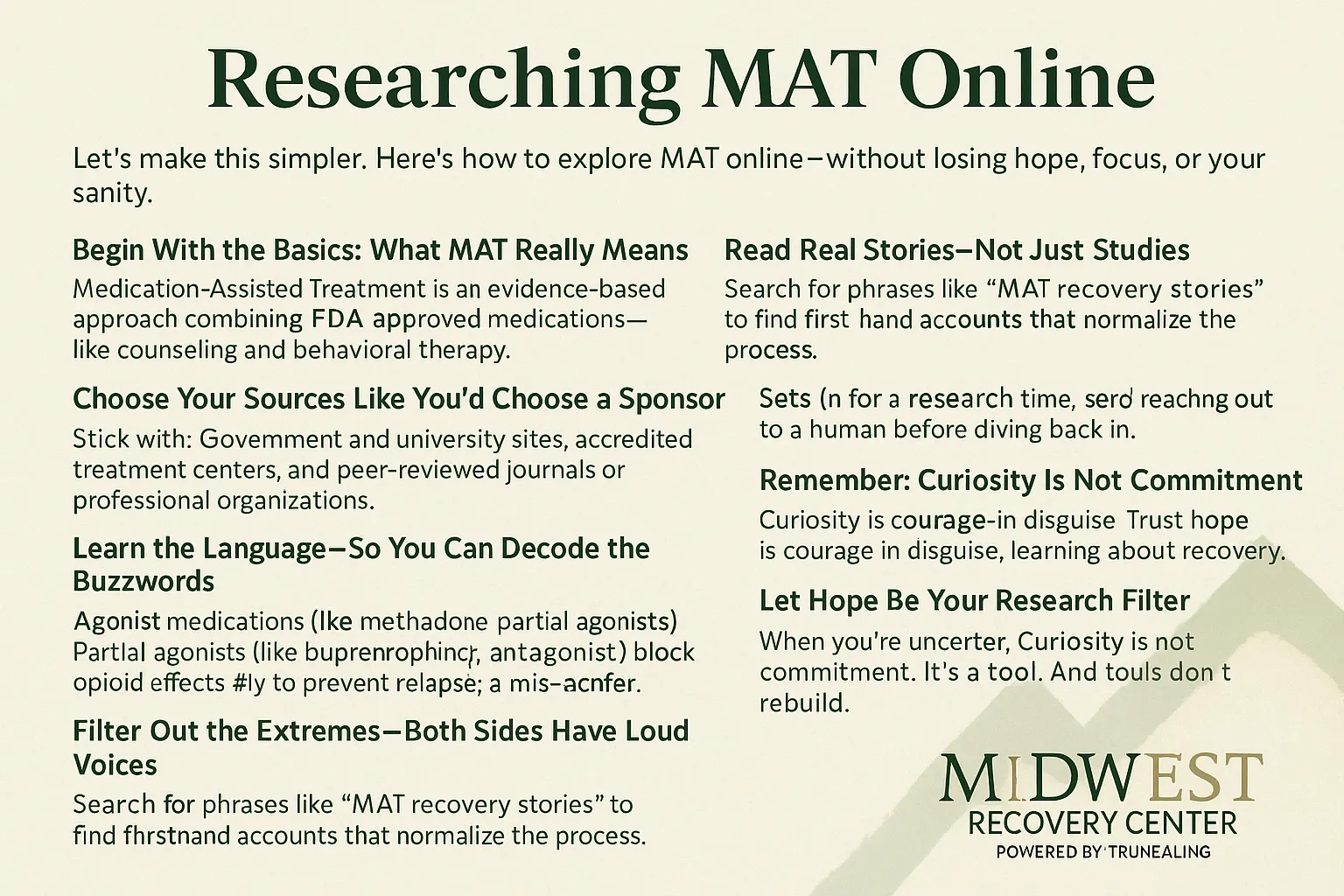When you’re sober curious, the urge to Google everything can hit hard. You start typing “Medication-Assisted Treatment success stories” and—two hours later—you’re deep in a forum argument about whether Suboxone is “real sobriety.”
It’s easy to get lost. The internet can both help and hurt your recovery curiosity. And when you’re exploring something as personal as Medication-Assisted Treatment (MAT), the last thing you need is more confusion.
Let’s make this simpler. Here’s how to explore MAT online—without losing hope, focus, or your sanity.
If you’d like a trustworthy place to start, check out Midwest Recovery Center’s Medication-Assisted Treatment program. Their clinicians explain MAT in clear, judgment-free terms, helping people understand options before they ever commit to a program.
1. Begin With the Basics: What MAT Really Means
The first trap in MAT research is misinformation. So before you read anything else, ground yourself in facts.
Medication-Assisted Treatment (MAT) is an evidence-based approach combining FDA-approved medications—like buprenorphine, methadone, or naltrexone—with counseling and behavioral therapy.
It’s not about “replacing one addiction with another.” It’s about helping your brain stabilize so therapy can work better, cravings can fade, and recovery can actually stick.
Think of MAT as a bridge: it connects withdrawal safety to emotional healing. When you understand that purpose, you can read with discernment, separating opinions from evidence.
2. Choose Your Sources Like You’d Choose a Sponsor
When you’re exploring recovery, your sources matter as much as your support system. Not all information deserves your trust.
Stick with:
- Government and university sites: SAMHSA, NIDA, and NIH are gold standards.
- Accredited treatment centers: Reputable facilities like Midwest Recovery Center share peer-reviewed, medically informed insights.
- Peer-reviewed journals or professional organizations: These often use accessible summaries, not just jargon-filled studies.
Avoid:
- Sites using emotional manipulation (“MAT ruins lives” or “you’ll never be sober if you use medication”).
- Comment threads that sound absolute (“if you use Suboxone, you’re not clean”).
When you center your learning around credible voices, you’ll get the truth—not the noise.
If you’re local, you can also learn directly from professionals providing Medication-Assisted Treatment in Maumee, Ohio, where clinical staff help you understand what each medication does and how it integrates with therapy.
3. Learn the Language—So You Can Decode the Buzzwords
The recovery world has its own vocabulary, and misunderstanding it can send you in the wrong direction. Here are a few key terms that show up in MAT research:
- Agonist medications (like methadone): Activate opioid receptors to reduce cravings safely.
- Partial agonists (like buprenorphine): Partially activate those receptors with a lower risk of misuse.
- Antagonists (like naltrexone): Block opioid effects entirely to prevent relapse.
- Tapering: Slowly reducing medication doses under medical supervision.
- Dual diagnosis: When substance use and mental health disorders coexist—and both need treatment.
Understanding these terms helps you read confidently without being thrown by jargon.

4. Filter Out the Extremes—Both Sides Have Loud Voices
When you’re new to this, extreme perspectives can feel like truth. Some say MAT is a “miracle,” others say it’s “just another addiction.”
Both are incomplete.
Recovery is personal. MAT can be transformative for one person and unnecessary for another. The only way to know is to understand your own biology, history, and goals—with a clinician’s help.
When reading testimonials or articles, ask:
- Does this person describe their journey or make a blanket claim?
- Are they medically supervised, or self-managing?
- Are they writing from science or emotion?
Balance is your compass.
5. Read Real Stories—Not Just Studies
The best research sometimes comes wrapped in a story. When you hear someone share how MAT helped them reconnect with their family, hold a steady job, or simply sleep through the night again—you learn more about real recovery than statistics can show.
Search for phrases like “MAT recovery stories” or “my experience with naltrexone”. Many treatment centers and recovery blogs share firsthand accounts that normalize the process.
At Midwest Recovery Center, alumni often describe MAT as a stepping stone—something that helped them regain control long enough to build a new life. That perspective matters more than any abstract data set.
6. Don’t Let Research Replace Action
It’s tempting to keep reading and never decide. That’s the quiet danger of internet research—you feel busy, but you’re not moving.
Set boundaries:
- Limit your research time (30–45 minutes at a time).
- Save trustworthy sources in one folder and close the rest.
- Reach out to a human before you dive back in.
Recovery isn’t found in endless scrolling—it’s found in connection. Whether that’s a clinician, a counselor, or someone in recovery, you need voices that answer you, not just your search query.
If you’re near northern Ohio, reaching out for Medication-Assisted Treatment in Perrysburg, Ohio can give you that clarity without the screen fatigue.
7. Remember: Curiosity Is Not Commitment
You don’t have to know if you want MAT yet. Researching doesn’t mean you’re signing up—it means you care enough to understand your options.
Curiosity is courage in disguise. The fact that you’re asking questions means recovery is already tugging at your sleeve.
Think of it this way: MAT isn’t a finish line or a failure—it’s a tool. And tools don’t define your recovery; they just make the building easier.
8. Ask Local Providers for a Judgment-Free Conversation
If you’re overwhelmed by online opinions, take a break and talk to someone who lives recovery daily. Local providers—like those at Midwest Recovery Center in Toledo—walk through the science and emotional reality of MAT in plain language.
They can answer questions like:
- “What happens if I want to stop medication later?”
- “Will this affect how others view my recovery?”
- “Can I still do therapy while taking medication?”
It’s the kind of clarity Google can’t give you—because it’s built on connection, not clicks.
9. Let Hope Be Your Research Filter
When you’re reading about MAT, notice what emotions rise up. Fear? Shame? Relief?
Let hope, not panic, guide your next step.
The truth is, Medication-Assisted Treatment doesn’t erase who you are. It helps you remember. It quiets the noise so you can rebuild.
And even if you never choose it, learning about it is still progress—it means you’re open to understanding what healing could look like.
FAQs About Medication-Assisted Treatment Research
1. What’s the biggest misconception about MAT?
That it’s “just replacing one addiction with another.” In reality, MAT medications are carefully prescribed and monitored by professionals to restore balance, reduce withdrawal, and help people focus on therapy and rebuilding life—not chasing a high.
2. How long do people stay on MAT?
It varies. Some stay on medication for months, others for years. The timeline depends on your stability, mental health, and personal goals. Tapering off is always a shared decision between you and your doctor, not a moral milestone.
3. Is MAT safe for long-term use?
Yes. Studies have shown long-term MAT can improve survival rates, reduce relapse, and enhance mental health outcomes. When managed properly, it’s safe and sustainable.
4. Can I do therapy while on MAT?
Absolutely. In fact, that’s what makes MAT work. The “medication-assisted” part supports your brain chemistry so you can actually absorb therapy and build coping skills without being hijacked by cravings.
5. How do I know if MAT is right for me?
Start by talking with a licensed clinician who specializes in addiction medicine. They’ll evaluate your history, goals, and emotional readiness. If you’re still uncertain, visiting a program for an informational consultation—like Midwest Recovery Center—can help you decide without pressure.
6. What if I’m afraid of judgment from others?
You’re not alone. Many people delay seeking help because of stigma. But choosing MAT doesn’t mean you’ve failed—it means you’re using science to fight back. Real recovery has no single path; it has many doors, and MAT is one of them.
The Bottom Line: Stay Curious, Stay Grounded
You don’t have to figure everything out tonight. You don’t even have to decide if MAT is right for you yet. What matters is that you’re searching—and that means you’re still hopeful.
Don’t let the internet drown that out. The next click doesn’t need to be another article—it could be a conversation that changes your life.
Call (888) 657-0858 to learn more about our Medication-Assisted Treatment services in Toledo, Ohio.
Whether you’re just curious or ready to take that first step, we’ll meet you where you are—with honesty, compassion, and a clear path forward.


























